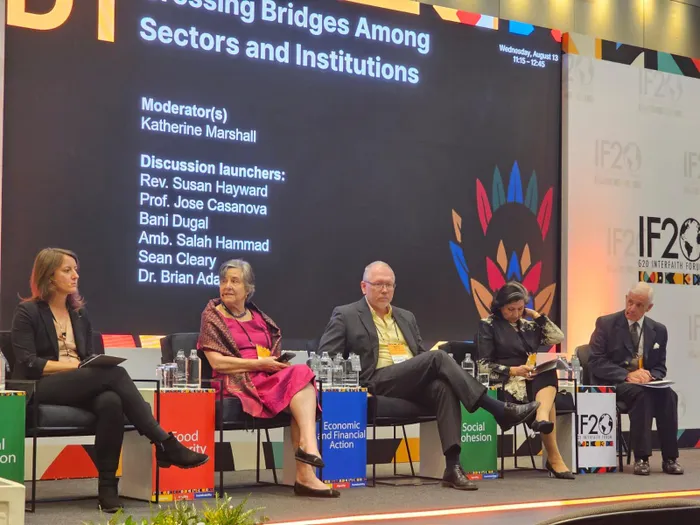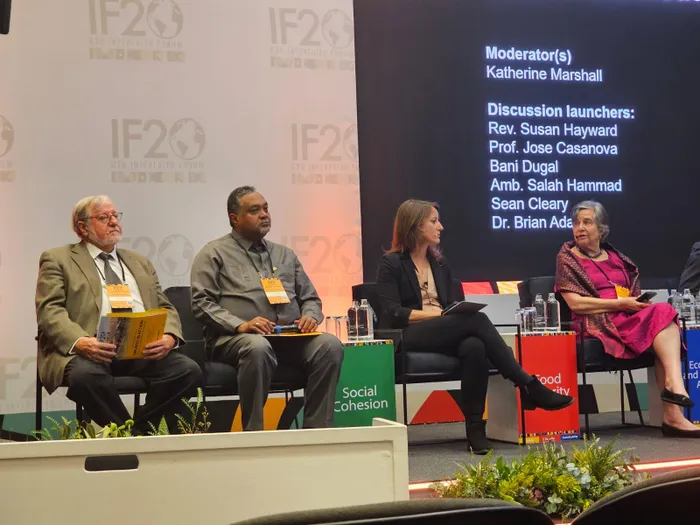
The panel discussion on “Crossing Bridges Among Sectors and Institutions” examined how integrated thinking is needed in the current socio-political climate.
Image: Theolin Tembo
Vice President of G20 Interfaith Forum Association, Katherine Marshall, had not been keeping attendees clued in with her morning recap of the G20 Interfaith Forum’s activities of the prior day, but on Wednesday, she moderated a panel discussion on “Crossing Bridges Among Sectors and Institutions”.
The IF20 forum convenes religious leaders, civil society organisations, government officials, multilateral institutions, and scholars to explore collaborative solutions to pressing global challenges.
The IF20 event is intended to reflect and reinforce South Africa’s G20 Presidency theme: “Solidarity, Equality, Sustainability”. The Cape Town event is intended as a catalyst for action, fostering partnerships that transcend borders, beliefs, and sectors.
The discussion examined how integrated thinking and cooperative action characterise many religious communities, while the current socio-political climate requires innovative cross-boundary work. The discussion also emphasised how interfaith groups work together to put Ubuntu in action, and not just talk about change.

Left to right: Emeritus Professor of Sociology, Theology and Religious Studies at Georgetown University, Prof Jose Casanova, Head of the AGA-APSA Secretariat at the African Union Commission, Amb. Salah Hammad, Research Fellow at Berkley Center, Georgetown, Rev. Susan Hayward, and Vice President of G20 Interfaith Forum Association, Katherine Marshall.
Image: Theolin Tembo
Marshall started the conversation by addressing the United States, which she called “the elephant in the room”.
Her fellow panellists included Research Fellow at Berkley Center, Georgetown Rev. Susan Hayward, Emeritus Professor of Sociology, Theology and Religious Studies at Georgetown University Prof Jose Casanova, Principal Representative of the Baha'i International Community Bani Dugal, Head of the AGA-APSA Secretariat at the African Union Commission Ambassador Salah Hammad, one of the founders of G20 Interfaith Forum Dr Brian Adams, and Executive Vice-Chair of Future World Foundation Sean Cleary.
Hayward said many of their efforts have been crippled under the second Trump administration, but the shuttering of this particular work “at a time when there is a turn away from human rights in the US and elsewhere” creates an opportunity for rebuilding and reimagining how to integrate the work they’ve done in the future.
“We talk about efforts being siloed; well, all the silos are gone at the moment. Maybe it is the Christian pastor in me, but I am leaning into the hope of this being an opportunity for us… to think anew how to do development, how to do diplomacy moving forward that can be far more systems base, and more flexible, and open to approaching things in a way that isn’t fixed,” Hayward said.
Casanova said he is often viewed as a sociologist among theologians and as a theologian among sociologists, and that there is a need to bridge the divide.
“Secular politics at every nation in the world is broken, global governance is broken, and we have a voice. We have to use our moral voice to set the table. We cannot simply reform what we have.”
Dugal said that the Ubuntu philosophy, reiterated throughout IF20, is interconnected at its core, and highlighted how grassroots levels have not seen the same connections made that are happening higher up in religious and political structures.
Hammad said that while at the African Union Commission, they have come to understand that it is important to reach out to various entities regardless of their school of thought, to enrich the process, and help connect the continent.
“We have a number of Memorandums of Understanding (MoUs) with various institutions, but lately we realised that there is another bridge that we are yet to cross. Those are the organisations that we have partnered with; they don’t fully take into consideration the participation of women and youth.
“Therefore, we were forced to some extent, to develop two strategies - one is a women empowerment strategy, and the other is the youth engagement strategy - and the purpose of these strategies is that while we are discussing or negotiating an MoU with any entity, to ensure that the MoU references the need to engage youth and women.”
He said there really is a need to engage the youth as the continent is very young, and ultimately, there is a need to join hands as it is a collective responsibility to promote peace, security and development across Africa.
theolin.tembo@inl.co.za
Related Topics: